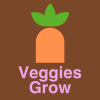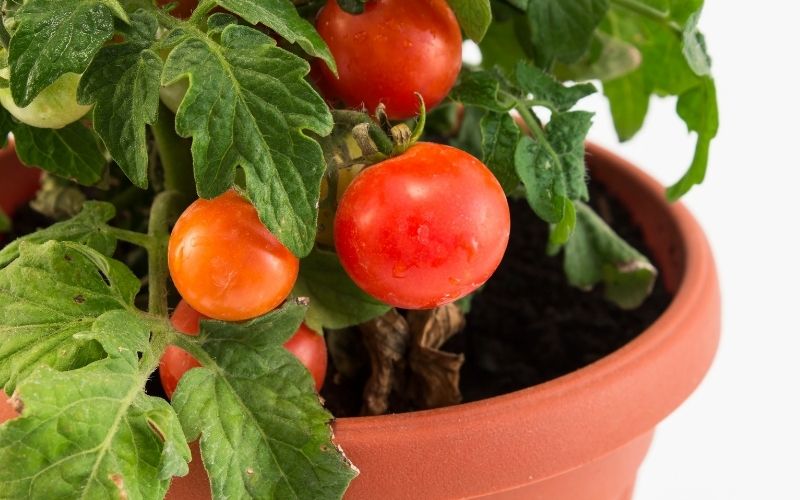Most vegetables can be grown in containers as long as the container is large enough. Starting a container vegetable garden is easy but it can be a little different from growing vegetables in an in-ground vegetable garden or even in raised beds. Knowing exactly what to expect will help you decide if a container vegetable garden is the right choice for you.
Advantages of growing vegetables in containers
1. Possibility of growing vegetables without a garden
If you live in an apartment or don’t have access to any suitable land for growing vegetables, you can start a vegetable garden using containers on a balcony or terrace.
2. Weed control is very easy
One of the most annoying things about an in-ground garden is the constant work required to keep weeds away, especially during the rainy season. Container-grown vegetables are rarely affected by weeds, as long as the soil or substrate used is weed-free.
3. Garden care can be done at any convenient time
This is my favorite part about growing vegetables in containers. All of us are almost always busy with work or family stuff, which leaves us without proper time to spend in the garden. Growing vegetables indoors or on a balcony in containers will help you to easily squeeze in some garden maintenance and care tasks into your schedule without having to devote a large block of time specifically to garden work.
4. To extend the life of summer vegetable plants
Many warm-season summer vegetable plants originated in tropical or subtropical climates and can easily keep producing for a year or two if their environment remains warm enough. If you grow your vegetables in containers or pots you will be able to bring them indoors and allow them to keep producing even if it’s winter outside and then put them back out when it is warm enough outside.
5. You can grow vegetables even if you don’t have suitable soil
Almost all vegetables grow best in well-draining loamy soil. Very few types of vegetables can grow in sandy or clay soil, and even if they do most of them won’t be as productive. Amending clay or sandy soil to a level that is suitable for growing vegetables can even take years, depending on your soil condition at the beginning.
If you don’t want to wait for months or years until your soil is amended enough, you can start your vegetable garden right away in containers, while you keep amending your soil.
6. Safely grow vegetables in soil that is at risk of being contaminated
If your garden is located close to intensively farmed land or near a very busy road, your soil could be at risk of being contaminated with heavy metals. Some heavy metals can be taken up by vegetables and then passed into humans when they are eaten.
A soil test will confirm if your soil is contaminated with unsafe levels of heavy metals. If that is the case, you should grow vegetables and any other edible plants in either containers or raised beds using potting soil and other sterilized substrates that have been brought from outside.
7. A lot more control over your vegetable plants
Overall, growing vegetables in containers gives you a lot more control over your plants, allowing you to give them just the right amount of nutrients and growing conditions they need. As much as this is an advantage, this can also mean that you need to have a closer watch on your vegetables.
Disadvantages of growing vegetables in containers
1. Vegetable plants grown in containers need to be watered frequently
With an in-ground vegetable garden, you can easily get away with watering your plants just once or twice a week as long as you deeply water your garden when you do water it. Container gardens are a whole different story.
Since containers contain a limited amount of soil or substrate they can’t store any water. This means that you will have to water your container vegetable plants at least once a day, and maybe even twice a day when it gets really warm.
More about watering container vegetables
2. Vegetables grown in containers are more likely to be affected by nutrient deficiencies
Nutrient deficiency issues, such as blossom-end-rot caused by calcium deficiency, are more likely to affect plants grown in containers. Just like the reserve of water, plants grown in containers only have access to the limited amount of nutrients that are in the container. This means that small imbalances between nutrients can have a larger impact on container-grown vegetables.
3. Starting a container vegetable garden can be a bit expensive
You can start an in-ground vegetable garden just by throwing in some seeds from store-bought vegetables at no cost at all. Container gardens will need a little bit of investment at first.
You will need to purchase the correct sized containers and usually potting soil or use another substrate, such as cocopeat, together with some compost, unless you make enough of your own. Gardening soil alone should not be used regardless of how good it is because it compacts very fast in containers and will block drainage from your containers.
4. Containers are not suitable for all types of vegetables
Corn and pumpkin are two examples of vegetables that can be grown in containers but are better suited to be grown directly on the ground.
You will need at least 16 corn plants growing together to make sure that they are properly pollinated and each plant will need a 5-gallon container. Most balconies or terraces will not have enough room for sixteen 5-gallon pots.
Pumpkin extends over a large area and a 10-gallon or larger container is needed. Again, a terrace or balcony may not be large enough.
Recommended container sizes for commonly grown vegetables and herbs
As you can see, the advantages of growing vegetables in containers outweigh the disadvantages. If you don’t have room for an in-ground vegetable garden, then a container vegetable garden may be the only way you can grow vegetables. You can also grow vegetables in containers in addition to your in-ground vegetable garden, if you think that this will help you provide better care and maintenance for your plants.
Regardless of whether you want to grow vegetables in containers due to need or want, understanding that it takes more effort to care for and may cost you a bit at first will help you decide if a container vegetable garden is the correct choice for you.
Interested in starting your own container vegetable garden? Check out our Ultimate Guide on Starting a Container Vegetable Garden


